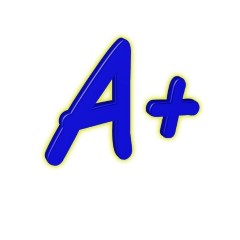STAT230 FINAL QUESTION AND SOLUTION
1. True or False. Justify for full credit. (25 pts)
(a) If there is no linear correlation between two variables, then these two variables are not related in any way.
(b) If the variance from a data set is zero, then all the observations in this data set are identical.
(c)P(A and Ā) =1, where Ā is the complement of A.
(d) In a hypothesis testing, if the P-value is less than the significance level α, we reject the null hypothesis.
(e) The volume of milk in a jug of milk is 128 oz. The value 128 is from a discrete data set.
Refer to the following frequency distribution for Questions 2, 3, 4, and 5. Show all work. Just the answer, without supporting work, will receive no credit.
The frequency distribution below shows the distribution for checkout time (in minutes) in UMUC MiniMart between 3:00 and 4:00 PM on a Friday afternoon.
Checkout Time (in minutes)
Frequency
1.0 - 1.9
2
2.0 - 2.9
12
3.0 - 3.9
2
4.0 - 4.9
4
2. What percentage of the checkout times was less than 3 minutes? (5 pts)
3. In what class interval must the median lie? Explain your answer. (5 pts)
4. Calculate the mean of this frequency distribution. (5 pts)
5. Calculate the standard deviation of this frequency distribution. (Round the answer to two decimal places) (10 pts)
Refer to the following data to answer questions 6, 7 and 8. Show all work. Just the answer, without supporting work, will receive no credit.
A random sample of STAT200 weekly study times in hours is as follows: 2 15 15 18 40
6. Find the sample standard deviation. (Round the answer to two decimal places) (10 pts)
7. Find the coefficient of variation. (5 pts)
8. Are any of these study times considered unusual based on the Range Rule of Thumb? Show work and explain. (5 pts)
Refer to the following information for Questions 9, 10 and 11. Show all work. Just the answer, without supporting work, will receive no credit.
Consider selecting one card at a time from a 52-card deck. Let event A be the first card is an ace, and event B be the second card is an ace. (Note: There are 4 aces in a deck of cards)
9. If the card selection is without replacement, what is the probability that the first card is an ace and the second card is also an ace? (Express the answer in simplest fraction form) (10 pts)
10. If the card selection is with replacement, what is the probability that the first card is an ace and the second card is also an ace? (Express the answer in simplest fraction form) (10 pts)
11. Are A and B independent when the selection is with replacement? Why or why not? (5 pts) Refer to the following information for Questions 12 and 13. Show all work. Just the answer, without supporting work, will receive no credit.
There are 1000 juniors in a college. Among the 1000 juniors, 200 students are taking STAT200, and 100 students are taking PSYC300. There are 50 students taking both
courses.
12. What is the probability that a randomly selected junior is taking at least one of these two courses? (10 pts)
13. What is the probability that a randomly selected junior is taking PSYC300, given that he/she is taking STAT200? (10 pts)
14. UMUC Stat Club must appoint a president, a vice president, and a treasurer. There are 10 qualified candidates. How many different ways can the officers be appointed? (5 pts)
15. Mimi has seven books from the Statistics is Fun series. She plans on bringing three of the seven books with her in a road trip. How many different ways can the three books be selected? (5 pts) Questions 16 and 17 involve the random variable x with probability distribution given below.
Show all work. Just the answer, without supporting work, will receive no credit.
x
-1
0
1
2
P (x )
0.1
0.3
0.4
0.2
16. Determine the expected value of x. (5 pts)
17. Determine the standard deviation of x. (Round the answer to two decimal places) (10 pts) Consider the following situation for Questions 18, 19 and 20. Show all work. Just the answer, without supporting work, will receive no credit.
Mimi just started her tennis class three weeks ago. On average, she is able to return 20% of her opponent’s serves. Assume her opponent serves 8 times.
18. Let X be the number of returns that Mimi gets. As we know, the distribution of X is a binomial probability distribution. What is the number of trials (n), probability of successes (p) and probability of failures (q), respectively? (5 pts)
19. Find the probability that that she returns at least 1 of the 8 serves from her opponent. (10 pts)
20. How many serves can she expect to return? (5 pts)
Refer to the following information for Questions 21, 22, and 23. Show all work. Just the answer, without supporting work, will receive no credit.
The heights of dogwood trees are normally distributed with a mean of 9 feet and a standard deviation of 3 feet.
21. What is the probability that a randomly selected dogwood tree is greater than 12 feet? (5 pts)
22. Find the 75th percentile of the dogwood tree height distribution. (10 pts)
23. If a random sample of 36 dogwood trees is selected, what is the probability that the mean height of this sample is less than 10 feet? (10 pts)
24. A random sample of 100 light bulbs has a mean lifetime of 3000 hours. Assume that the population standard deviation of the lifetime is 500 hours. Construct a 95% confidence interval estimate of the mean lifetime. Show all work. Just the answer, without supporting work, will receive no credit. (15 pts)
25. Given a sample size of 100, with sample mean 730 and sample standard deviation 100, we perform the following hypothesis test at the
H0:u=750 H1:u≠750
(a) Determine the test statistic. Show all work; writing the correct test statistic, without supporting work, will receive no credit.
(b) Determine the critical values. Show all work; writing the correct critical value, without supporting work, will receive no credit.
(c) What is your conclusion of the test? Please explain. (20 pts)
26. Consider the hypothesis test given by H0:p=0.5
H1:p<0.5
In a random sample of 225 subjects, the sample proportion is found to be p̂= 0.51.
(a) Determine the test statistic. Show all work; writing the correct test statistic, without supporting work, will receive no credit.
(b) Determine the P-value for this test. Show all work; writing the correct P-value, without supporting work, will receive no credit.
(c) Is there sufficient evidence to justify the rejection of H 0 at the a =0.01 level? Explain. (20 pts)
27. In a study of memory recall, 5 people were given 10 minutes to memorize a list of 20 words. Each was asked to list as many of the words as he or she could remember both 1 hour and 24 hours later. The result is shown in the following table.
Number of Words Recalled
Subject
1 hour later 24 hours later
1
2
3
4
5
14 12
18 15
11 9
13 12
12 12
Is there evidence to suggest that the mean number of words recalled after 1 hour exceeds the mean recall after 24 hours?
Assume we want to use a 0.01 significance level to test the claim.
(a) Identify the null hypothesis and the alternative hypothesis.
(b) Determine the test statistic. Show all work; writing the correct test statistic, without
supporting work, will receive no credit.
(c) Determine the critical value. Show all work; writing the correct critical value, without supporting work, will receive no credit.
(d) Is there sufficient evidence to support the claim that the mean number of words recalled after 1 hour exceeds the mean recall after 24 hours? Justify your conclusion. (20 pts)
Refer to the following data for Questions 28 and 29.
x
0
-1
3
5
y
3
-2
3
8
28. Find an equation of the least squares regression line. Show all work; writing the correct equation, without supporting work, will receive no credit. (15 pts)
29. Based on the equation from # 28, what is the predicted value of y if x = 4? Show all work and justify your answer. (5 pts)
30. The UMUC MiniMart sells four different types of teddy bears. The manager reports that the four types are equally popular. Suppose that a sample of 100 purchases yields
observed counts 30, 24, 22, and 24 for types 1, 2, 3, and 4, respectively.
Type
1
2
3
4
Number
30
24
22
24
Assume we want to use a 0.10 significance level to test the claim that the four types are equally popular.
(a) Identify the null hypothesis and the alternative hypothesis.
(b) Determine the test statistic. Show all work; writing the correct test statistic, without supporting work, will receive no credit.
(c) Determine the critical value. Show all work; writing the correct critical value, without supporting work, will receive no credit.
(d) Is there sufficient evidence to support the manager’s claim that the four types are equally popular? Justify your answer. (20 pts)
STAT230 FINAL QUESTION AND SOLUTION
1. True or False. Justify for full credit. (25 pts) (a) If there is no linear correlation between two variables, then these two variables are not related in any way. (b) If the variance from a data set is zero, then all the observations in this data set are identical. (c)P(A and Ā) =1, where Ā is the complement of A. (d) In a hypothesis testing, if the P-value is less than the significance level α, we reject the null hypothesis. (e) The volume of milk in a jug of milk is 128 oz. The value 128 is from a discrete data set. Refer to the following frequency distribution for Questions 2, 3, 4, and 5. Show all work. Just the answer, without supporting work, will receive no credit. The frequency distribution below shows the distribution for checkout time (in minutes) in UMUC MiniMart between 3:00 and 4:00 PM on a Friday afternoon. Checkout Time (in minutes) Frequency 1.0 - 1.9 2 2.0 - 2.9 12 3.0 - 3.9 2 4.0 - 4.9 4 2. What percentage of the checkout times was less than 3 minutes? (5 pts) 3. In what class interval must the median lie? Explain your answer. (5 pts) 4. Calculate the mean of this frequency distribution. (5 pts) 5. Calculate the standard deviation of this frequency distribution. (Round the answer to two decimal places) (10 pts) Refer to the following data to answer questions 6, 7 and 8. Show all work. Just the answer, without supporting work, will receive no credit. A random sample of STAT200 weekly study times in hours is as follows: 2 15 15 18 40 6. Find the sample standard deviation. (Round the answer to two decimal places) (10 pts) 7. Find the coefficient of variation. (5 pts) 8. Are any of these study times considered unusual based on the Range Rule of Thumb? Show work and explain. (5 pts) Refer to the following information for Questions 9, 10 and 11. Show all work. Just the answer, without supporting work, will receive no credit. Consider selecting one card at a time from a 52-card deck. Let event A be the first card is an ace, and event B be the second card is an ace. (Note: There are 4 aces in a deck of cards) 9. If the card selection is without replacement, what is the probability that the first card is an ace and the se...





Academia
Senior JournalistSell Your Solution Report Solution Support Center
Online Users
-
 Academia
Today
Academia
Today





A+ - Thank you!
Thanks for the positive feedback!